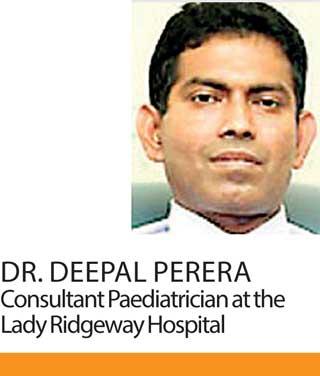07 May 2021 - {{hitsCtrl.values.hits}}

 Vitamins are a quintessential part of our diet and restricting its intake would result in compromising on one’s well-being. Speaking to Health Capsule, Consultant Paediatrician at the Lady Ridgeway Hospital, Dr. Deepal Perera sheds more light on the symptoms of vitamin deficiency and how it affects our health.
Vitamins are a quintessential part of our diet and restricting its intake would result in compromising on one’s well-being. Speaking to Health Capsule, Consultant Paediatrician at the Lady Ridgeway Hospital, Dr. Deepal Perera sheds more light on the symptoms of vitamin deficiency and how it affects our health.
Explaining that there are water soluble vitamins and fat soluble vitamins, Dr. Perera stated that Vitamin A, D, E, K are fat soluble vitamins whereas vitamin B and C are water soluble vitamins.
Vitamin A
Vitamin A is derived from animal and plant based products. While plant products provide you with carotene, retinol is provided by animal products. These are important for healthy eyes and mucus membranes. “Fruits such as carrot, sweet potatoes, papaya and any other yellow fruit or vegetable are generally rich in beta carotene, whereas one can obtain retinol through the consumption of eggs, fish and other animal products. Dry eyes and Bitot’s spots, night blindness, gastro intestine infections and respiratory infections due to affected mucus membranes are some signs of Vitamin A deficiency. All children starting from 6 months up to 5 years are provided with a Vitamin A mega dose every six months, especially in Sri Lanka since Vitamin A deficiency is a common problem observed in Sri Lanka unlike in western countries,” Dr. Perera said.
Vitamin B
According to Dr. Perera, Vitamin B1 (Thiamine) is found in par boiled red rice. “Beriberi is a condition that results due Thiamine deficiency followed by lethargy and drowsiness. Vitamin B12 is the other common vitamin sourced from animal food. Vegetarians may develop vitamin B12 deficiency due to the lack of consuming animal based food products. Symptoms involve hyper pigmentation, anemia, lesions and affects to the central nervous system.
Vitamin B12, folic acid and iron are required to expel the risk of developing anemia. Folic acid is crucial to prevent the risk of neural tube defects and cleft palate in new born babies. Pre consumption of folic acid and vitamins are vital during pregnancy to prevent defects in the embryo. Folic acid consumption is important even at the stage of family planning to prevent potential adverse health effects in the future,” the doctor added.
Vitamin C
Vitamin C is richly available in citrus fruits such as lime, lemon and oranges and helps prevent infections. Symptoms associated with Vitamin C deficiency are scurvy, which involves weakness, sore arms and legs, gum diseases and throat infections.
Vitamin D
Sourced from animal food and through exposure to the morning sun light, Vitamin D is a nutrient that helps in the development and maintenance of bones and is vital for calcium absorption. “Rickets is a disease caused due to Vitamin D deficiency and may result in changes to the skull and chest. Other symptoms may involve stunted growth, bowed legs, bone deformities and bone pain. Rickets is reversible and treatment involves high doses of Vitamin D. Children should be exposed to sun light during morning hours and it must be noted that among vitamins, children are mostly diagnosed for vitamin D deficiency in Sri Lanka,” Dr. Perera added.
Vitamin E
Leafy greens such as spinach and green fruits and veggies are rich in Vitamin E. Being a fat soluble vitamin, Vitamin E is important for sexual maturity, helps improve the immune system and the development and maintenance of hair. Deficiencies of Vitamin E include poor vision, muscle pain and weakness.
Vitamin K
Deficiencies of Vitamin K may include easy bruising and bleeding. Vitamin K is administered to babies at birth because it helps prevent hemorrhages. Also, they help in coagulation and helps alleviate the deficiencies in vitamin K dependent coagulation proteins found in factor II, VII, IX in the liver. Vitamin K is generally found in pumpkin, spinach and cabbage.
Take home message
“Encourage young children to engage in outdoor activities to absorb more natural sunlight, which is the best dose of Vitamin D one can get. Also, youngsters and adults should opt to consuming more natural food products as per the permitted daily dietary intake. Hence, the need to consume artificial food supplements would be far less and the only way to prevent the risk of vitamin deficiencies is thorough applying such principles to one’s life,” Dr. Perera concluded.
21 Dec 2024 21 minute ago
21 Dec 2024 3 hours ago
21 Dec 2024 3 hours ago
21 Dec 2024 4 hours ago
21 Dec 2024 8 hours ago